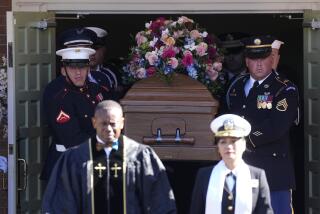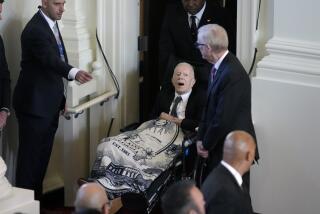A tribute from the ‘anchor’
NEW YORK -- Bassist Ron Carter sometimes wishes he could go back in time to the 1960s and play again with the Miles Davis Quintet -- one of the most acclaimed and influential small combos in jazz history.
It’s not that Carter, who turned 70 in May, is overly nostalgic. It’s just that 40 years ago his bass could hardly be heard amid Davis’ trumpet, Wayne Shorter’s saxophones, Herbie Hancock’s piano and Tony Williams’ drums.
Carter still plays the same Czech-made upright bass that he bought for $125 when he came to New York in 1959 to study for his master’s degree at the Manhattan School of Music, but today he can take advantage of the special bass pickups, improved amplifiers and other technological breakthroughs that have enabled audiences to really hear the instrument.
“I wish that back in those days the bass would have been as physically audible as it is now,” said Carter, who recently released the CD “Dear Miles,” honoring his mentor, who died in 1991. “I could have made an even larger impact on the band . . . and I’ve learned a lot more music since those days.”
Carter insists on debunking one popular misconception about Davis -- that the trumpeter was disdainful to his audience because he turned his back to them. Rather, Carter says, Davis preferred to stand sideways and close to the bassist because otherwise he couldn’t hear the bass.
“I always tell people, ‘Look, when you see Leonard Bernstein looking at you and conducting the orchestra, then you can talk about Miles with his band,’ ” said Carter, seated at the dining-room table in his Upper West Side apartment, which is filled with paintings and sculpture by African American artists collected by his late wife, Janet.
“Miles was very aware of the audience’s responses to the music. . . . If a song really wasn’t happening and the audience wasn’t responding as he hoped they would . . . he would adjust the program.”
That’s among the lessons Carter took from his 1963-68 tenure with the trumpeter’s quintet -- an experience he likened to “going into a laboratory like chemists” to experiment every night by mixing different musical ingredients. The band members took a more elastic approach to playing standards and composed tunes that became standards for future generations.
Davis dubbed Carter the “anchor” of the band. Carter went beyond the bassist’s traditional role of rhythm-keeper, prodding the soloists by changing the beats and harmonies and even sometimes playing melody lines.
Since leaving Davis, Carter has made it his mission to take the double bass “out of the shadows” of the rhythm section and prove it can be a legitimate lead instrument.
Carter, a National Endowment for the Arts Jazz Master, may be the world’s most recorded jazz bassist, with more than 2,000 credits. The bassist feels “flattered” when pop stars such as Paul Simon, Roberta Flack and Aretha Franklin or the hip-hop group A Tribe Called Quest enlist his services because they believe “this jazz player can help their project be successful.”
For years, Carter had been reluctant to jump on the Miles Davis bandwagon by recording his own tribute album.
“I had avoided doing that because I thought that most records that I heard really didn’t understand Miles’ music. I waited until I could find an environment that I felt would do a service to his name and our relationship.”
Carter could easily have enlisted the other surviving members of the ‘60s quintet, Hancock and Shorter, and added a guest trumpeter. Instead, he recorded the CD with his long-standing working quartet.
More to Read
The biggest entertainment stories
Get our big stories about Hollywood, film, television, music, arts, culture and more right in your inbox as soon as they publish.
You may occasionally receive promotional content from the Los Angeles Times.










